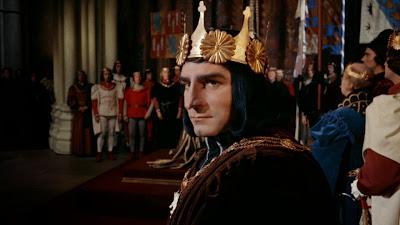Format: Streaming video from Hulu+ on The Nook.

Is it that Laurence Olivier is a pimp or is it just that he picks big pimpin’ roles? For me, his pimptastic performance in Wuthering Heights was the best part of that film. I figured it was just the character. Now I see Richard III, the adaptation of Shakespeare’s play of the same name and I’ll be damned if he’s not a stone cold pimp in this, too. Again, I’m sure it’s the role, but a lot of it is the way that Olivier plays it.
The role of Richard III is one of the great male roles in the history of the theater, let alone in the works of Shakespeare. If you’re going to do Richard III as accurately as possible in the mid-1950s, who better to do it than Laurence Olivier, the greatest actor and Shakespearean of his generation? It could be argued without much trouble that this is Olivier’s best film performance, again, exactly what you want from the greatest actor of his age.
I’m not going to run through the plot here except in the broadest of strokes. If you don’t know Richard III, by all means go read it. It’s not my favorite Shakespeare by any stretch, nor even my favorite of the histories (that will always be Henry V), but it is one of the greatest dramas ever put to paper. The film starts with the admonition that what we are about to see is not actual history. Instead, it is the stuff of legend and myth. Certainly some of the tale is probably true, but now much is actually true is anyone’s guess. Shakespeare depicts Richard as having a series of physical deformities including a hunchback, a limp, and a withered arm. Did he? I have no idea, nor do I care. As the opening text crawl suggests, this is legend, after all, and reality is far less important than the legend.
Anyway, the story revolves around the plot of Richard (Laurence Olivier) to obtain the throne of England from his brother Edward IV (Cedric Hardwicke). This is despite Richard’s being instrumental in putting Edward on the throne in the first place. There are plenty of crosses and double crosses, double-dealing and murders for hire to remove a variety of impediments to Richard’s ascension to the throne. This includes framing his own brother George (John Gielgud) for treason against the crown and having him murdered by preventing the stay of execution from reaching the Tower of London. It also involves Richard having his two nephews smothered in the Tower lest they put forth their own claims.
I called Olivier’s Richard a pimp at the top and I stand by it. One of the more interesting aspects of the story is what happens with Anne (Claire Bloom). Richard kills both her father and her husband in cold blood, then claims to her that he did so specifically so that he could marry her…and she falls for it. That’s a part of the play, of course, but in Olivier’s hands it’s a thing of sexual mastery. Anne does eventually marry Richard because she can’t resist his charms, and Olivier makes that completely believable.
One of the best aspects of a film like this is that Olivier had the cachet to get the best and most experienced crew of Shakespearean actors in the world to jump in on his film. In addition to the cast already mentioned (note that the three actors named all technically have “Sir” in front of them), he also roped Sir Ralph Richardson for the role of Buckingham—and that role was intended originally to go to Orson Welles.
For all its grandeur, and there’s a lot of that here, it was nominated solely for Olivier’s performance in the title role. I could see a few other nominations here, but not any otential wins. Cinematography is a possibility, for instance, and I could see a Supporting nod for Richardson or possibly Laurence Naismith as Lord Stanley, who plays a pivotal role in the second half of the film.
The problems with Richard III are mainly inherent to the play. Richard III is the end history of an entire series of history plays—the two Henry IVs, Henry V, and the three Henry VIs. A certain knowledge of those plays and the history is assumed in Richard III, as well as a certain level of knowledge of the War of the Roses. Olivier’s biggest issue here is the staging of the battle at the end. He’s very much gone for drama instead of realism, because we see archers marching up to the front lines and firing without regard to enemy troops a few feet away who could easily slaughter them.
Still, Richard III is about the conspiracies and eventually the fighting. It’s not a terribly exciting film and requires careful attention to follow all of the characters and all of the ever-shifting loyalties. It’s worth it for Olivier, though, who is in top form. Just know that it overstays its welcome a little until the very end when the swords finally come out.
Why to watch Richard III: Arguably the best Olivier performance ever recorded on film.
Why not to watch: If you’re not down for accurate Shakespeare, you’re not down for this.
